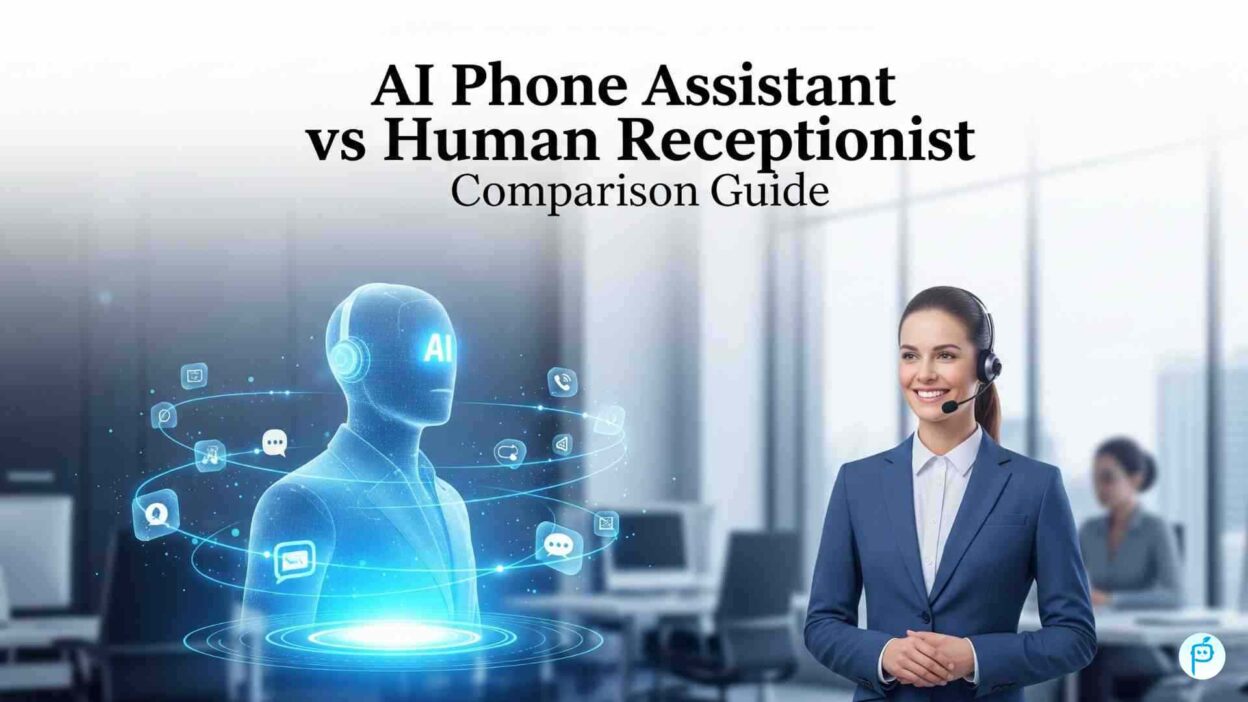The debate between AI phone assistant vs human receptionist has become crucial for modern businesses. Companies face important decisions about their front-line customer service approach. Technology advances rapidly while human touch remains valuable. This comprehensive guide explores both options thoroughly.
Table of Contents
Business owners need clear information to make informed choices. Customer expectations continue evolving in 2025. Cost considerations play a major role in decision-making processes. We’ll examine every aspect of this important business decision.
Understanding AI Phone Assistants
AI phone assistants represent cutting-edge technology in customer service. These systems use artificial intelligence to handle incoming calls automatically. Machine learning algorithms power their conversation capabilities. Natural language processing helps them understand caller intent.
Modern AI assistants can schedule appointments efficiently. They answer frequently asked questions instantly. Call routing happens based on caller needs. Integration with business systems occurs seamlessly.
Voice recognition technology has improved dramatically. AI systems now understand various accents better. Response times are consistently fast. Programming allows customization for specific business needs.
Key Features of AI Phone Systems
AI phone systems offer 24/7 availability without breaks. They handle multiple calls simultaneously without delays. Consistent messaging ensures brand uniformity across interactions. Data collection happens automatically during conversations.
Call analytics provide valuable business insights. Integration with CRM systems streamlines workflows. Multilingual support expands customer reach significantly. Cost per call remains predictably low.
Scalability allows growth without proportional staffing increases. Updates and improvements deploy instantly across systems. Training time is minimal compared to human staff.
The Role of Human Receptionists
Human receptionists bring personal warmth to customer interactions. They understand emotional nuances in conversations naturally. Complex problem-solving abilities exceed current AI capabilities. Relationship building happens through repeated interactions.
Personal judgment helps navigate unusual situations effectively. Cultural sensitivity comes naturally to experienced staff. Empathy provides comfort during difficult conversations. Flexibility allows adaptation to unexpected scenarios.
Human staff can upsell services during conversations. They recognize VIP customers and adjust treatment accordingly. Local knowledge helps with directions and recommendations. Professional appearance matters for in-person interactions.
Advantages of Human Staff
Human receptionists excel at reading between the lines. They provide emotional support during stressful situations. Complex scheduling conflicts get resolved through creative thinking. Personal connections foster customer loyalty over time.
Judgment calls happen naturally without programming requirements. Crisis management skills activate during emergencies. Learning from experience improves performance continuously. Team collaboration enhances overall office efficiency.
Cultural understanding prevents miscommunication issues. Personality matching with company culture occurs naturally. Professional development adds value over time.
Cost Analysis: AI Phone Assistant vs Human Receptionist
Financial considerations drive many business decisions today. AI systems require significant upfront investment initially. Monthly subscription fees replace traditional salary expenses. Long-term costs favor AI solutions generally.
Human receptionists need competitive salaries and benefits packages. Training costs accumulate with new employee onboarding. Sick days and vacation time require coverage arrangements. Healthcare benefits add substantial overhead expenses.
AI systems eliminate payroll taxes entirely. No workers’ compensation insurance is needed. Overtime costs never apply to automated systems. Consistent monthly expenses simplify budget planning.
Initial Investment Comparison
AI phone systems typically cost $200-$1000 monthly. Setup fees range from $500-$5000 depending on complexity. Integration with existing systems may require additional investment. Training time for staff is minimal.
Human receptionists earn $25,000-$45,000 annually in most markets. Benefits packages add 20-30% to base salaries. Office space and equipment create additional expenses. Recruitment and training costs money and time.
Return on investment calculations favor AI for high-volume operations. Break-even points typically occur within 12-18 months. Scaling costs remain predictable with AI solutions.
Performance and Efficiency Metrics
AI systems maintain consistent performance levels always. Response times remain under 3 seconds typically. Call handling capacity is virtually unlimited. Accuracy rates exceed 90% for routine inquiries.
Human performance varies based on individual capabilities. Energy levels fluctuate throughout workdays naturally. Multitasking abilities have natural limitations. Personal issues can affect work performance.
AI systems never require coffee breaks or lunch periods. They work holidays and weekends without complaints. Consistency in tone and messaging is guaranteed. Performance metrics are easily trackable and measurable.
Availability and Reliability
AI phone assistant vs human receptionist availability differs significantly. AI systems operate 24/7 without interruption. They handle peak call volumes without degradation. System updates happen during low-traffic periods.
Human staff work standard business hours typically. Vacation coverage requires planning and coordination. Sick days create service interruptions unexpectedly. Holiday schedules reduce availability periods.
Backup systems for AI prevent complete service failures. Redundancy ensures continuous operation always. Human backup requires additional staff scheduling.
Customer Experience Considerations
Customer preferences vary widely across demographics and industries. Younger customers often prefer AI efficiency and speed. Older demographics may favor human interaction warmth. Service complexity influences preference significantly.
AI provides consistent, accurate information every time. Waiting times are minimal or nonexistent. Language barriers get addressed through multilingual programming. Patience never wears thin with automated systems.
Human receptionists offer personalized attention naturally. They remember regular customers and preferences. Emotional intelligence helps during difficult situations. Personal touch creates memorable experiences.
Industry-Specific Requirements
Healthcare requires empathy and understanding during calls. Legal services need confidentiality and professionalism. Hospitality benefits from personal warmth and recommendations. Emergency services require quick decision-making abilities.
AI excels in appointment-heavy industries like dental offices. Retail businesses benefit from consistent product information. Financial services appreciate data security features. Manufacturing companies need reliable order processing.
Service complexity determines the best solution choice. Simple, routine tasks favor AI implementation. Complex, relationship-based services benefit from human touch.
Integration and Setup Considerations
AI phone systems integrate with existing business software easily. CRM connections streamline customer data management. Calendar systems sync for appointment scheduling. Payment processing can happen during calls.
Setup time for AI systems takes days or weeks. Training existing staff requires minimal time investment. Customization options allow business-specific programming. Technical support ensures smooth implementation processes.
Human receptionist integration involves extensive training periods. Company culture orientation takes time and effort. System training spans multiple software platforms. Relationship building with team members is essential.
Technical Requirements
AI systems need reliable internet connections primarily. Cloud-based solutions reduce hardware requirements significantly. Mobile accessibility allows remote management capabilities. Regular updates maintain security and functionality.
Human receptionists need office space and equipment. Computer systems require regular maintenance and updates. Phone systems need installation and configuration. Ongoing technical support creates additional expenses.
Scalability planning differs between both solutions significantly. AI grows through software upgrades easily. Human scaling requires physical space and recruitment.
Future Trends and Predictions
AI technology continues advancing rapidly each year. Voice recognition accuracy improves with machine learning. Natural language processing becomes more sophisticated daily. Integration capabilities expand with new software partnerships.
Hybrid solutions combining AI and human staff emerge. Initial AI screening transfers complex calls to humans. This approach maximizes efficiency while maintaining personal touch. Cost benefits combine with service quality improvements.
Customer expectations evolve with technology availability. Instant responses become standard service expectations. Personalization through data analysis increases satisfaction levels. Seamless multichannel experiences gain importance.
Making the Right Choice for Your Business
Business size influences the optimal solution significantly. Small businesses may benefit from AI cost savings. Large enterprises might need human relationship management. Medium-sized companies often choose hybrid approaches.
Industry requirements should guide decision-making processes. Customer demographics affect preference patterns notably. Service complexity levels determine feasibility of AI solutions. Budget constraints influence implementation timelines.
The AI phone assistant vs human receptionist decision requires careful analysis. Consider customer needs and business goals equally. Evaluate long-term growth plans and scalability requirements. Test solutions before making final commitments.
Read More: How Voice AI For Customer Retention Calls Keeps Clients Loyal
Conclusion

Both AI phone assistants and human receptionists offer distinct advantages. The choice depends on specific business needs and circumstances. Cost-conscious businesses often favor AI solutions initially. Relationship-focused industries may prefer human staff.
Hybrid approaches provide balanced solutions for many companies. Technology will continue improving AI capabilities steadily. Human skills remain valuable for complex interactions. The future likely includes both options working together.
Evaluate your specific situation carefully before deciding. Consider customer preferences and business objectives equally. The right choice supports growth and customer satisfaction simultaneously. Make informed decisions based on data and business requirements.





